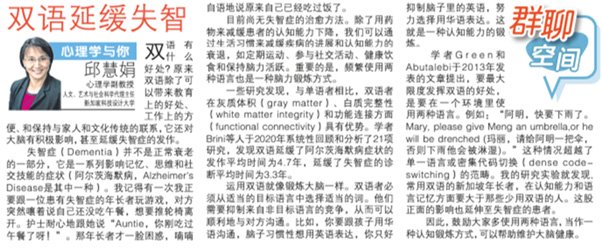Bilingualism delays dementia
Shin Min Daily News, 9 Sep 2023, Bilingualism delays dementia (translation)

What are the benefits of bilingualism? It turns out that in addition to educational benefits, work convenience and maintaining connections with family and cultural traditions, bilingualism also has a positive impact on the brain and even delays the onset of dementia.
Dementia is not a normal part of ageing. It is a set of symptoms (Alzheimer’s Disease is one) that affects memory, thinking and social skills. I recall once when I was playing a game with an elderly person with dementia, the person suddenly yelled that she hadn’t eaten lunch yet and wanted to leave in her wheelchair. The nurse patiently said to her “Auntie, you just had lunch!” The elderly lady looked confused and muttered that she had already eaten.
There is currently no cure for dementia. Besides using medications to slow down cognitive decline in patients, the progression of the disease and cognitive decline can also be delayed through lifestyle habits, such as regular exercise, participating in social activities, eating healthily and staying mentally active. What’s important is the frequent use of two languages is also a form of mental exercise.
Some studies have found that bilinguals have advantages in gray matter volume, white matter integrity and functional connectivity compared with monolinguals. Scholars Brini and others systematically reviewed and analysed 21 studies in 2020 and found that bilingualism delayed the onset of Alzheimer’s disease by an average of 4.7 years and delayed the diagnosis of dementia by an average of 3.3 years.
Using two languages is like exercising your brain. Bilinguals must choose appropriate words from the appropriate target language. They need to suppress competing non-target languages so as to successfully communicate with others. For example, if you want to communicate with your children in Mandarin, your mind will habitually want to express itself in English, so you have to suppress the English in your mind and strive to choose to express in Mandarin. This is a cognitive exercise.
A 2013 article by researchers Green and Abutalebi proposed that to maximise the benefits of bilingualism, two languages must be used within one environment. For example: “阿明,快要下雨了。(Ah Meng, it’s going to rain) Mary, please give Meng an umbrella, or he will be drenched.” This situation goes beyond a single language or dense code-switching. My research experiments found that senior Singaporeans who are frequently bilingual have better cognitive abilities and language memory than those who are less bilingual. This positive impact also extends to people with dementia.
Therefore, I encourage everyone to use two languages as a form of cognitive exercise, as it can help maintain brain health.
